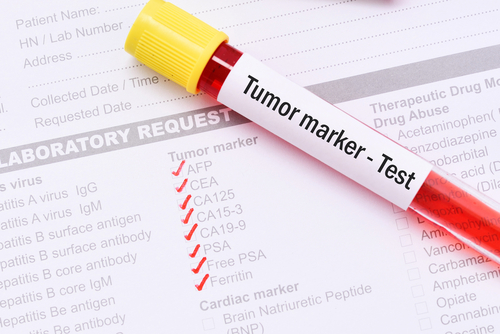A protein called CD151 is highly expressed on the surface of high-grade serous carcinoma (HGSC) cells, the most common and lethal subtype of ovarian cancers, recent research found.
Expression of this surface protein is associated with tumor progression and a poor prognosis, suggesting that its levels could serve as a biomarker for HGSC.
The study, “Interrogation of Functional Cell-Surface Markers Identifies CD151 Dependency in High-Grade Serous Ovarian Cancer,” was published in Cell Reports.
HGSC is currently treated with a combination of surgery and platinum or taxane-based chemotherapy, but it is an aggressive cancer that often recurs.
Using cell lines derived from 40 epithelial ovarian cancer patients, 32 of whom had HGSC, researchers identified 278 candidate genes coding for proteins required for most tumor cell lines to survive. Within these proteins, they focused on those exclusively found at the surface of tumor cells, reducing their target list to 12 protein candidates.
The team then compared the levels of these surface proteins in HGSC cell lines with those observed in cell lines derived from normal fallopian tube tissue. The protein CD151 was found to be highly expressed in HGSC cell lines and essential for tumor cell survival.
Further experiments in animal models of ovarian cancer confirmed that CD151 was required not only for tumor cell viability but also for tumor initiation and maintenance. In its absence, tumor cells were unable to adhere and proliferate in the superficial tissue layer of the ovaries or the peritoneal cavity.
The researchers found that cancer cell dependency on this surface protein was mediated by two proteins called ZEB1 and ZEB2, and was associated to resistance to anti-EGFR drugs, such as Tarceva (erlotinib) and Iressa (gefitinib).
Analysis of 500 human HGSC tumors, obtained from the Canadian Ovarian Experimental Unified Resource (COEUR) cohort, revealed reduced overall survival in patients with high-CD151 compared to low-CD151 expression (37 months v. 55 months). This data suggests that high CD151 levels in primary human disease are predictive of poor outcome.
“By identifying CD151 and its underlying role in cancer cell survival, we hope to develop a therapy to target it. As a marker for poor prognosis, with further research, there is the potential to develop a clinical screening tool to help personalize cancer treatment for patients,” the study’s lead author, Mauricio Medrano, said in a press release.
Epithelial ovarian cancer is the fifth leading cause of cancer-related deaths in women in the U.S., and the cause of over 100,000 deaths per year worldwide.

